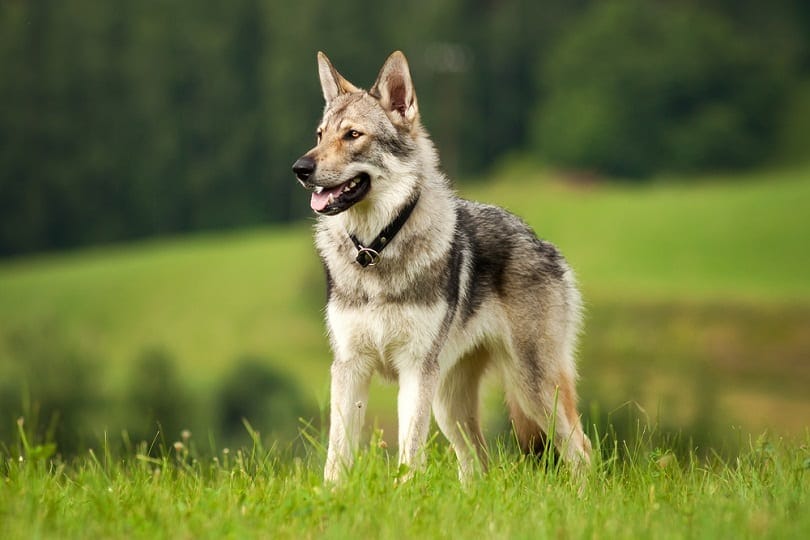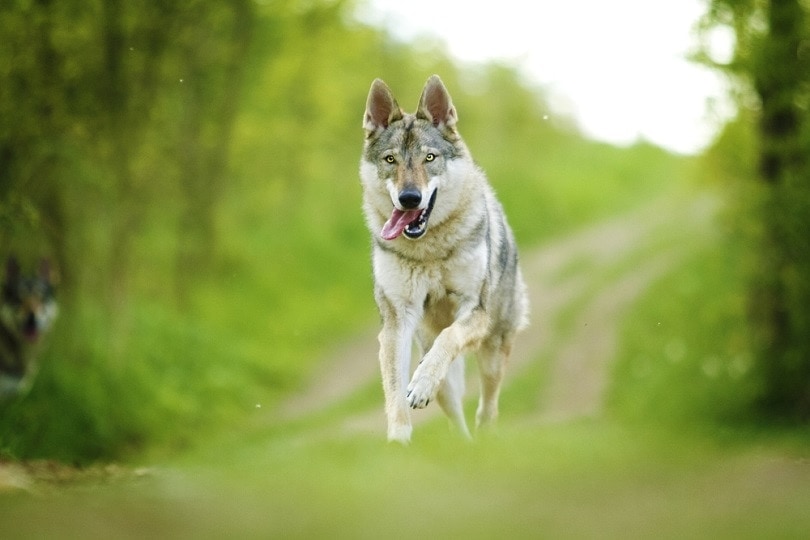What Is a Wolf Dog? What Science Tells Us

Updated on

In recent years, the wolf-dog has become one of the most controversial breeds in North America due to its growing popularity as a pet. This large animal could be a good companion for one person but problematic or even dangerous for another. So, what exactly is a wolf dog?
A “wolf dog” is a canine with recent genetic ancestry from both wolves and domestic dogs. You might think all dogs have some wolf in their genetic makeup, which is true in a sense, but they cannot be considered wolf dogs unless they have a pure wolf ancestor in the last five generations.
Are Wolf Dogs Domesticated?
The term “domesticated animal” refers to an animal that has been selectively bred and adapted over many generations to live with humans.1 They are genetically separate from their wild ancestors and cousins. So, wolf dogs are not technically domestic companions, particularly the popular breeds.
What Two Animals Make a Wolf Dog?
People breed a wolf dog by mixing a wolf and a wolf dog, a wolf and a dog, or two wolf dogs. Chow Chows, Akitas, German Shepherds, Alaskan Malamutes, and Siberian Huskies are often a part of this large canine. Also, the wolf part of the bloodline might come from a population of wolves bred in captivity for many years since capturing a wolf in the wild is illegal.

Why Are Wolf Dogs Bred?
Surprisingly, wolf dogs are nearly entirely the result of human manipulation. Wolves in the wild are typically, but not always, monogamous and fiercely territorial, seeing most other canines (including coyotes, dogs, and wolves outside their pack) as competitors for the resources they need to survive. Therefore, rather than welcoming a dog into their pack or considering them a potential mate, most wild wolves would probably react aggressively to a dog approaching their territory, chasing or even attempting to kill that animal.
In addition, a free-ranging dog has very little chance of coming across a wild wolf of the opposite sex alone during the breeding season (between January and March), as both male and female wolves can only breed once a year.
Now you may wonder why people purposefully breed wolf dogs. There are many reasons for this, from thinking they are making a better guard or simply preferring the wolf look. It’s a common misconception that mating wolves and domestic dogs will result in offspring with the optimum balance of wild and domestic qualities. In fact, the ideal dog most people are looking for rarely appears. If you’re thinking about adding a wolf dog to your family, read to the end to learn important information about them and see whether they are a good fit for you.
Are Wolf Dogs Illegal in the US?
The U.S. government basically leaves such rules up to individual states, which frequently defer to even more localized government units at the county and city levels. As a result, there are no clear national laws regarding adopting a wolf dog.
Texas, Arizona, Louisiana, New Hampshire, Arkansas, Alaska, Colorado, Iowa, Indiana, Kansas, Minnesota, New Mexico, Oregon, Washington, Nevada, Ohio, North Carolina, Oklahoma, New Jersey, Montana, South Carolina, Utah, Tennessee, West Virginia, Wisconsin, Vermont, and Nebraska all have local laws that apply to this canine.2
However, even in the states that accept wolf dogs, many also mandate registration, vaccinations, and confinement in some kinds of cages. In addition, there are a few regulations based on the amount of wolf content, such as in California, where only first-generation wolf dogs are illegal.

Are Wolf Dogs Dangerous?
Wolf dogs still exhibit a lot of their wild parents’ instinctive behavior. They are stubborn and can be very aggressive. Their natural prey instinct can also be triggered by a screaming child or the movements of small animals. If you leave them alone for too long, they may become bored and destructive to property. You must consider all these factors carefully because having a wolf dog as a pet requires far greater responsibility than keeping a Golden Retriever or a Lab. Due to their potential risk to people and other animals, many cities have banned wolf dogs.
What States Ban Wolf Dogs?
States like Connecticut, Hawaii, Georgia, the District of Columbia, Illinois, Maryland, Massachusetts, Pennsylvania, Michigan, New York, Wyoming, and Rhode Island ban the ownership of wolf dogs as pets. If you want to bring this animal into your home, you need to do your research and make sure that it’s legal where you live.
Is a Wolf Dog Right for You?
According to the National Wolfdog Alliance, almost 65% of all wolf dogs purchased are euthanized or rescued by the age of 3. Early in 2015, media organizations started blaming Game of Thrones for idealizing wolfdogs because many people sought out dogs with wolf content in order to recreate a fictional experience at home. Some owners say they are dedicated, loving, and trainable, while others believe they are too unpredictable, violent, and wild. Unfortunately, there is no such thing as a “typical” wolf dog, and there is no way to know how “wolf-like” a dog will be.
Since these canines need a lot of space to be happy, healthy, and active, they are better suited for experienced owners who live in the forest or wilderness. Also, they are only a good fit for owners who can devote enough time to them. If you spend your entire working week away from home, this animal is not for you.
Conclusion
Even though wolf dogs are still dogs, owning one requires a great deal of knowledge because this canine combination has many potential traits that can make them a challenging addition to your family. They also vary widely from one another—while some make excellent pets, others are difficult to train because they are not as eager to please their owners as domestic pups.
- You might also like: 15 Wolf Dog Hybrid Breeds You May Not Have Seen Before
Featured Image Credit By: gloverk, Shutterstock










